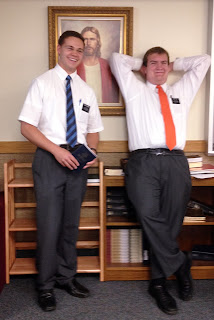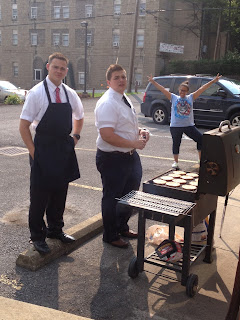I gave this talk on forgiveness during a sacrament meeting in January. A few people asked me for copies, so I figured the easiest way would be to post it. This isn't exactly what I said -- I can't stick to a script for anything -- but it's what I had written down, so it should be pretty close. :)
--
When I was eleven years old, I was
permanently disabled because a surgeon made a mistake while performing a procedure
without consent. It took years for me to forgive that doctor, and that
bitterness stole a lot of my life. I would do things that made me happy for a
while, but they didn’t create lasting peace. Each time I did them, the
happiness they gave me lasted for a shorter time, leaving me to repeat them
over and over to keep myself from feeling worse than I did in the beginning. I
didn’t see any way out of that cycle. I was angry at the doctor, at my family,
and at myself. I didn’t think God existed, but if He did, I was angry at Him
too. The God who other people loved had made me be born with an incurable
disease and then let that doctor make it worse, and I saw no way to ever be
freed from the burden of what had been done to me.
Learning of the restored gospel of
Jesus Christ was the most incredible gift that I can imagine. I learned of
God’s love for each of us and of my own divine worth. Through the gospel, I was
miraculously able to repent of the acts I had done during my years of
bitterness and be transformed. An essential part of that process was finding
the strength to forgive and to be forgiven. By that point in my life, extending
forgiveness didn’t require nearly as much strength as you might expect – it was
truly my only option.
In Doctrine and Covenants 64, the
Lord tells Joseph Smith, “I, the Lord, will forgive whom I will forgive, but
of you it is required to forgive all
men.”
Most of us have heard that
scripture before, but I would like to really examine it with you today.
According to lds.org, the word
“forgive” has two meanings in the scriptures. One of those definitions will be
given later in my talk. The other states, “As people forgive each other,
they treat one another with Christlike love and have no bad feelings toward
those who have offended them.”
Why would the Lord require us to forgive?
Extending forgiveness to another
person is for us. Our forgiveness of the unrepentant sinner does not excuse him
from the consequences of his sins. Rather, we are called upon to live by the
oath to “Let God judge between me and thee, and reward thee according to thy
deeds.” Our forgiveness does not mean justice won’t be done; it means that
we will place our trust in God to take care of that justice for us.
All of the commandments we have
been given are for our benefit. The Word of Wisdom helps us to be healthy in
body and mind; the Law of Chastity helps us avoid the heartache so often
wrought by being involved in sacred, intimate acts outside of the bonds of
marriage. Likewise, we are commanded to forgive so that we can be freed.
Withholding our forgiveness from
another person is a spiritual impediment to us, regardless of its impact on
another. Forgiving others is primarily about restoring our personal
relationship with God, not with the person who we must forgive. By choosing to
forgive, we act upon our trust in God and allow Him to take up our burdens.
Finding it within myself to have that much trust in God – to wholeheartedly
hand my burdens over to Him and believe in His willingness to take care of it
so I could be relieved – is one of the most difficult parts of forgiveness for
me, but I’ve learned that it is absolutely necessary.
A church member whose brother was
murdered wrote, “I found that the solution for a weed-ridden heart is to
employ the Master Gardener, the Savior Jesus Christ. He has the power to heal
any heart. He requires only one thing: we must offer our hearts fully to Him
and let Him work in His own way.” In our journey through life, all of us
will be wounded. Bad things happen all the time. It’s easy to find ourselves
being burdened down by those wounds, little by little.
The healing power of the Atonement
is the means by which those wounds can be healed, and the requirement of that
healing is that we trust in the Lord and forgive. That forgiveness does not
redeem he who sinned against us, but it does redeem us. Emptying our hearts of
bitterness and anger creates room for the purifying power of the Atonement to
work within us, filling our souls with joy and consolation.
The second definition given for the
word “forgive” is “When God forgives men, he cancels or sets aside a
required punishment for sin. Through the atonement of Jesus Christ, forgiveness
is available to all who repent.”
I hope we are all familiar with
this type of forgiveness. As we follow God, each of us is asked to strive for
perfection. Our ultimate goal, as the whiteboard in the institute reminds me
every day, is to return to our Father’s presence. No unclean thing can dwell in
the presence of God, and all of us, at some point in our lives, will be
unclean. We strive for perfection, but none of us are perfect right now. The
pains and sins of this world are unavoidable at this stage of our progression,
and only through the atonement of Jesus Christ can we be cleansed and healed as
we repent.
When I discussed this topic with
the missionaries, Elder Bovee shared a thought that I’d like to quote. “Although
we continually fall short and make mistakes, I am convinced that the love of
our Savior and the power of his
Atonement reach a depth beyond our imperfections. Through the strength of
Christ’s perfect love, we can rise above our sins, no matter how serious they
may be.”
There is no depth that Christ cannot reach to rescue us.
There is no darkness that the light of the atonement cannot penetrate. In the
words of the Prophet Joseph Smith, “There is never a time when the spirit is
too old to approach God. All are within the reach of pardoning mercy.”
Obtaining forgiveness when we have
sinned is not automatic. There’s no “easy button” for repentance. The offer of
forgiveness is always available, as is our Father’s unfailing love, but we are
asked to repent by freely confessing our sins to the Lord, making restitution,
and changing our ways. Repentance can be uncomfortable, as is all change, but I
testify that it is the path to lasting peace. In cases when we cannot do
anything to heal the damage caused by our sins, the way to forgiveness is still
open to us. The apostle Boyd K. Packer once said, “The Lord provides ways to pay our debts to Him. In one
sense we ourselves may participate in an atonement. When we are willing to
restore to others that which we have not taken, or heal wounds that we did not
inflict, or pay a debt that we did not incur, we are emulating His part in the
Atonement.” No sin is
too great, no harm too irreparable, for us to receive divine forgiveness.
Perhaps even harder than forgiving
others and seeking forgiveness from the Lord is forgiving ourselves. In his
famous talk about judging others, President Uchtdorf reminded us, “When the Lord requires that we forgive all men, that includes forgiving
ourselves. Sometimes, of all the people in the world, the one who is the
hardest to forgive—as well as perhaps the one who is most in need of our forgiveness—is the person looking back at us in the mirror.”
The scriptures teach us
that once we have repented and been forgiven of a sin, Heavenly Father no
longer remembers that sin and it is as if it never happened. However, we do not forget our sins. The memory of
our failings is retained so that we can learn from our mistakes, enabling us to
progress towards our eternal goal. This does not mean that we should spend all
our days in guilt – instead, we should trust in our Father in Heaven when He
tells us that we’ve been forgiven. The benefit of learning from our past
transgressions by remembering them is voided by excessive guilt, which can tear
us further from our Heavenly Father by filling us with feelings of inadequacy.
I’d like to end this
talk with another quote from President Uchtdorf: “Remember, Heaven is filled
with those who have this in common: They are forgiven. And they forgive.” I
testify to you that this is true. Forgiveness clears the way for broken hearts
to be mended and broken people to be healed. It restores our bonds with our
Heavenly Father, and it helps us to become more like Him in the exercise of
true Christlike love.
































